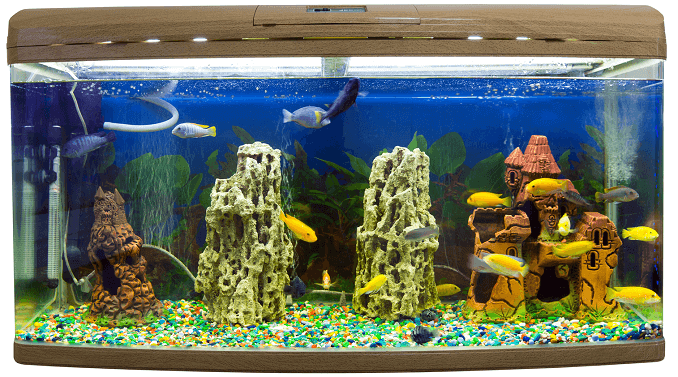Let us look at the common causes of stress that can lead to the premature death of your pet fish.
Contents
- You didn’t properly set up your aquarium
- Your aquarium setup doesn’t suit your fish
- Your aquarium is too small
- You are mixing incompatible fish
- You are overfeeding your fish
- You are not performing regular maintenance
- Your aquarium encountered rapid water changes
- You killed the beneficial bacteria in your aquarium
- Your fish experienced rough travel
- Your fish has a disease or parasite
- Your fish is old.
1: You didn’t properly set up your aquarium

The first thing you want to do is cycle your aquarium.
You see, fish are not the only things that live in your aquarium. A healthy tank also has bacteria that break down and remove waste from your aquarium.
To put it simply, this bacteria keeps the water safe for your fish.
Just one problem – this bacteria does not exist in a new aquarium. If you add your fish now, your fish can become stressed and die.
So, what you want to do is introduce this bacteria into your aquarium – ideally before you buy your fish.
The process of establishing this good bacteria is referred to as cycling your aquarium.
Ideally, cycling your aquarium should be done before you buy your fish because the process can take a couple of weeks
- Your aquarium setup doesn’t suit your fish
Your tank should be set up to suit the fish that you keep.
A saltwater fish will die in a freshwater aquarium. Similarly, a fish that prefers warm water will likely die in cold water.
But just because your fish isn’t dead yet doesn’t mean that your setup is right. In fact, while your fish appears to be surviving, it may be stressed beyond belief. And as we discussed earlier, stress can lead to an early death.
Take betta fish for instance. They prefer calm water, so strong water movement, say from a filter nozzle or bubbler, can stress a betta out.
A pleco, on the other hand, needs plenty of places to hide. Without a safe spot to hole up, plecos can become stressed.
Meanwhile, African cichlids need hard alkaline water, the exact opposite of cardinal tetras, who thrive in soft, acidic water.
Failing to provide an appropriate environment for your fish can lead to it dying well before its time.
Because no two fish are alike, read up on the preferences of your fish before introduction to your tank. Where one fish may thrive, another fish may become stressed and eventually die.
- Your aquarium is too small
Too many fish in your aquarium? An overcrowded tank is essentially a death sentence for your fish for numerous reasons.
First, you know that good bacteria I talked about in the previous section – the one that breaks down waste to keep the water healthy?
Well, it can only break down so much at a time. Generally speaking, the larger the tank (and filter), the more good bacteria there will be to break down waste.
So, the more fish you add to your aquarium, the more poop. If your fish are pooping at a faster rate than the good bacteria can break it down, then your water can soon turn toxic – killing all your fish in the process.
For beginners, this is most commonly seen when betta or goldfish are kept in an aquarium that is too small, but it can happen in an aquarium of any size.
But it’s not just overcrowding that is the issue. A small tank, without much room to move, can cause a fish to become stressed, leading to an early death.
Finally, overcrowding can actually cause your fish to suffocate…
Like you and me, fish need oxygen to breathe – without it, they will soon die.
The problem is that there is only so much oxygen in your aquarium. And if you have too many fish, then they will be breathing faster than the oxygen can be replaced, causing them to suffocate.
And remember, fish grow. Just because your fish is small now doesn’t mean it will stay that way forever. Your goldfish might be less than 2 inches now, but it can grow to a whopping 10 inches!
- You are mixing incompatible fish.
Not all fish get along.
While you may have the best intentions, you may have accidentally created an underwater cage fight instead of a peaceful home for your fish.
Some fish that are commonly owned by beginners are downright aggressive – fish such as cichlids, Chinese algae eaters, blue gourami and male betta can be territorial, fight over food and even attack or bully other fish.
In the wild, your fish would be able to easily escape its bully. Unfortunately, your aquarium is much smaller, and your fish has no other choice but to flee for its life, day and night.
Being constantly chased and nipped at by a territorial fish is stressful and will likely lead to your fish dying sooner than it should.
Before you purchase any new fish for your aquarium, ask about their compatibility with the other fish in your aquarium.
- You are overfeeding your fish
Another extremely common form of death is overfeeding.
It always surprises a beginner just how little food fish actually eat.
Take a single betta for instance – you know those micro-pellets they eat? Well, your betta only needs three to keep full. Any more than this and you are overfeeding.
But the reason overfeeding is bad for your fish is because it causes the water to become dangerous.
To put it simply, whatever goes into your fish must come out. The more you feed your fish, the more they poop. Also, uneaten food decays, creating more waste.
This waste quickly fouls up your water and before long, becomes toxic, killing your fish.
Also, you want to make sure that you are feeding your fish the right food. A meat eater isn’t going to live long eating fish food made from vegetables.
- You are not performing regular aquarium maintenance
You should be setting time aside every week or two to clean your aquarium. This typically includes wiping down the glass, cleaning the substrate and checking to ensure everything is in working order.
But perhaps the most important maintenance is performing a water change.
You and me? We have the luxury of keeping our home clean by throwing out the trash and flushing the toilet.
Your fish on the other hand, must swim in it. If waste continues to build up and you do nothing about it, your fish are at risk of dying.
It is for this reason that you should perform a weekly water change.
By removing 10-20% of the gunked up water in your tank each week and replacing it with fresh water, you’ll keep your fish happy and healthy.
- Your aquarium encountered rapid water changes
Rapid swings in water temperature, pH or salinity can shock a fish, which soon leads to death.
It is for this reason that you should acclimate any fish that you bring home before adding them to your aquarium. There can be a large difference between the water in the bag and the water in your aquarium.
Likewise, if you are performing a large water change in your aquarium, the temperature of the water being added should not be too different from that of your aquarium.
Any changes that you make to your aquarium water should be slow and steady.
- You killed the beneficial bacteria in your aquarium
As I touched on earlier, after you cycle your tank, you will have good bacteria living in your aquarium. And, this bacteria breaks down waste that would otherwise make your fish sick and ultimately die.
For the most part, this beneficial bacteria lives in your filter and substrate.
If this bacteria dies, then the water in your aquarium will soon turn toxic, killing your fish.
How does this bacteria die? It’s often by mistake.
If you forget to add a dechlorinator during a water change, then you will wipe out the entire bacteria colony – chlorine is a bacteria killer (and a fish killer too!).
Similarly, if you rinse your filter with tap water, the chlorine will do the same.
Another way is when replacing your filter or filter media. Your new filter will not contain any beneficial bacteria, which will lead to waste quickly accumulating to lethal levels.
- Your fish experienced rough travel
Can you imagine walking outside when all of a sudden someone abducts you and sticks you in a tiny cell?
Sounds stressful, right?
Actually, it sounds like a scene straight out of a horror story! But it’s not much different than the journey many fish destined for aquariums make.
If your fish is wild-caught, then it made a journey halfway across the world just to end up in a small tank in your local fish store.
It is possible that the fish you buy are already stressed from this long journey.
Similarly, the last leg from the fish store to your home can be a killer.
That plastic bag you bring your fish home? Well, it only has so much oxygen in it.
Also, too much shaking of the bag is definitely going to stress your fish.
- Your fish has a disease or parasite
Research shows that humans are more likely to catch a cold when under stress.[1]
Well, studies show that the same goes for fish.[2]
You see, a healthy, stress-free fish has a strong immune system – their skin, scales and slime coat are more than capable of fending off any disease or parasite.
A stressed fish, on the other hand, is more prone to illness and disease, which can ultimately end in the death of your pet.
Keeping your fish stress-free goes a long way toward keeping your fish alive.
- Your fish is old
Finally, you have old age.
I’ll be honest, for a beginner wondering why their fish died, this is perhaps the least likely answer.
However, if your fish has had a previous owner, then it is plausible that your fish passing may simply be due to leading a full life.
After all, no fish is going to live forever, and one day your lively little fish is going to give up the ghost.
Yep, no matter how well you care for your fish… There is no escaping old age.
Just how long before your fish passes entirely depends on the breed. For bettas, 4 years is considered old, while a healthy goldfish can live for 10.
Published by:
Nelson Amimo
Marketing Mnager-African Aquatics Export

Add a Comment
You must be logged in to post a comment